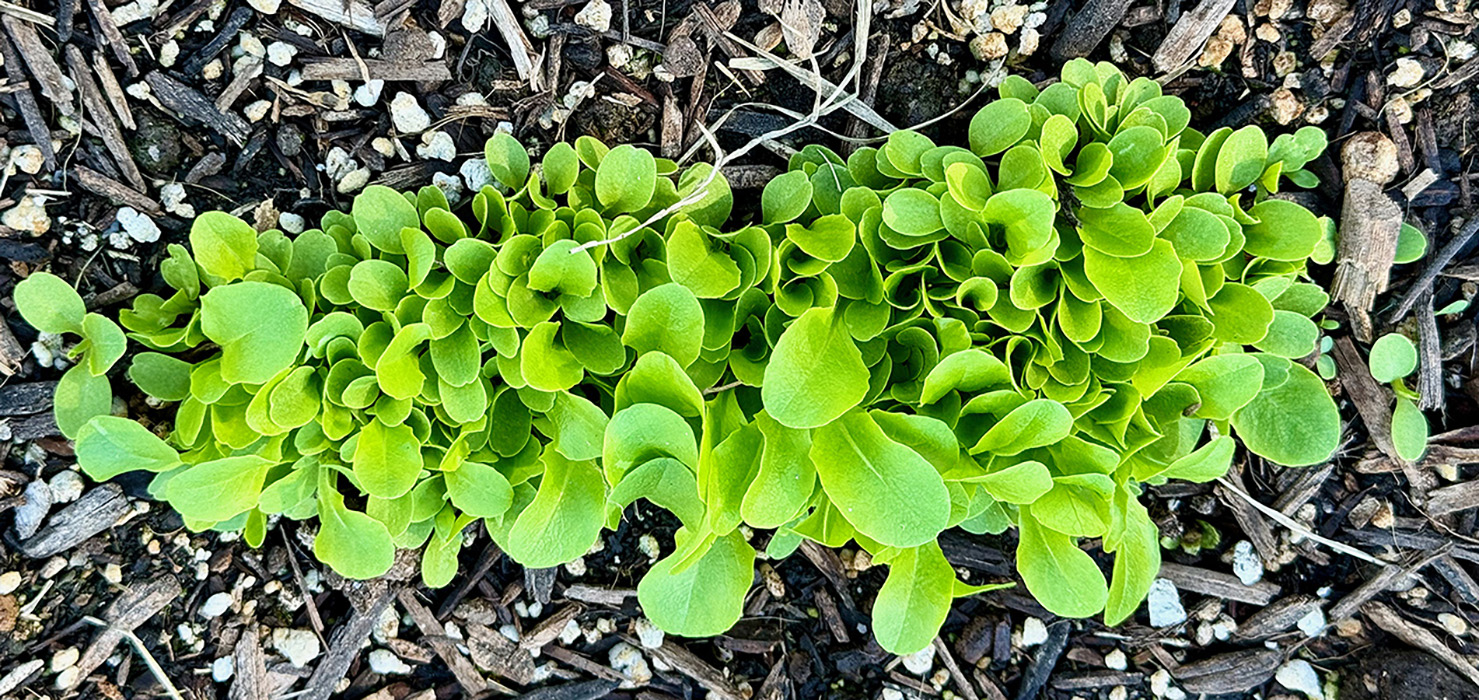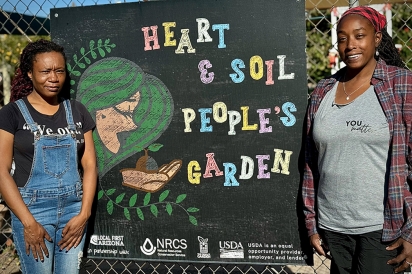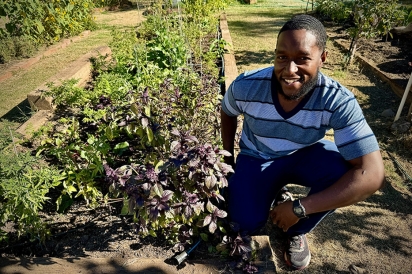Where We Grow From Here
The 100 largest U.S. cities are tending more than 29,000 community gardens, according to internet sources. How many are in Phoenix? Where are they? Who runs them? How do they work? Researching these questions was like opening nested, interconnected boxes.
The community garden resurgence is relatively new and growing fast. Its roots likely date to the 1940s, when the U.S. Department of Agriculture encouraged planting “Victory Gardens” to help feed the nation during World War II. First Lady Eleanor Roosevelt famously planted one at the White House. It is estimated one third of all vegetables grown in the U.S. in the World War II years came from millions of Victory Gardens. The current community garden movement took off when First Lady Michelle Obama planted a White House kitchen garden in 2009. That garden grows on, under the care of the National Park Service.
A community garden is planted, cared for and harvested by neighbors, co-workers, church or club members, or just interested citizen participants. The land may be owned by one of the gardeners or by a nonprofit, a business or a governmental agency. Many feature individual garden beds rented to participants; some provide shared plots and some dedicate space as sources for food banks. Most community gardens are run by volunteers, although some have paid workers.
Although community gardens were originally about simply growing food, they have become more complex and have expanded to support other community goals. These include building community integration and enrichment, supporting mental and physical health, creating food security, improving dietary habits and reducing food expenses, all while beautifying and utilizing vacant land, increasing environmental awareness, developing climate-change flexibility and supporting small-scale entrepreneurship, according to the website community-gardening.org.
All this exists in Phoenix, as I discovered during a day spent touring two community gardens in South Phoenix. These two examples merely scratch the surface.
HEART & SOIL PEOPLE’S GARDEN, 1730 S. 2nd St., Phoenix
There’s an oasis under the airport flyway, next to the freeway, in a former used tire dump: the Heart & Soil People’s Garden. Garden Director Nika Forté greets me at the ornamental front gate. Ten years ago, this quarter-acre lot was revitalized by Pat Fleischmann, owner of Community Tire Pros. She took it upon herself to transform it into a neighborhood garden. When Pat retired one year ago, she deeded the property to Local First Arizona, a nonprofit foundation that champions small-scale local enterprises. (LFA supports several community gardens and many other related projects in greater Phoenix—a story to be unpacked in a later issue.) LFA offered Forté the opportunity to manage the endeavor. Forté was thrilled; she had a vision of developing this little garden into a prototype for “Empowering Women, Nourishing Communities and Cultivating Sustainable Futures.”
The website states: “At Heart & Soil People’s Garden, we believe in the power of community, the value of inclusivity, and the importance of sustainable, healthy living. Our garden serves as a vibrant hub for women and people of color to grow and share fresh, healthy produce, develop valuable skills and contribute to a thriving, eco-conscious community.” (heartandsoilgarden.org)
Heart & Soil People’s Garden is recognized and supported as a flagship people’s garden by the USDA. In the past year a USDA garden grant funded an outdoor kitchen, teaching area, shade structure, water and power systems and additional amenities, including a temporary toilet.
Forté runs on passion. Her full-time paid job is director of farms for St. Vincent de Paul. Did you know the St. Vincent de Paul charity grows and distributes vegetables?) Forté also runs Baehive—a beekeeping sisterhood with classes, training and community workshops dedicated to “saving bees through sisterhood.” (baehive.org)
She knows what it is like to be financially strained. After years as a single mom of two kids, juggling bills to provide basic needs like good, healthy food, she found the AmeriCorps training program and fell in love with gardening.
“There is no better feeling than putting a seed in the dirt, then actually seeing people eat and appreciate the results,” Forté says. “I love being in nature and getting my hands in the dirt. It’s therapy where I find the peace and the time to think.” She continues, “I love bringing women together to gather energy and support each other.”
The garden itself supports a sisterhood of women gardeners, beekeepers, their families and the bees. Twice a month they celebrate as an open market with music and entertainment, where women can grow their own small businesses featuring crafts, honey and food. Garden produce is sold or given out on a “pay-what-you-can” or donation basis. Over Christmas, Heart & Soil hosted the Single Fathers Network toy drive “Rooted in Kindness” with Black Santa. Besides market days and night markets (11am–2pm in the winter and 6-9 pm in the summer), Heart & Soil hosts tai chi and yoga classes, craft fairs and classes in beekeeping and gardening. All this in the first year! “We’re just getting started,” Forté says.
Heart & Soil People’s Garden is open to everyone, and Forté invites you to stop by to volunteer, learn, host a table or to celebrate and support Heart & Soil People’s Garden with a contribution to help pay for utilities, plumbing repairs and garden expenses.
Information and Contact:
https://heartandsoilgarden.org
https://www.facebook.com/heartandsoilgarden
Donate: https://localfirstaz.com/news-blog/growing-food-with-heart
THE GARDEN OF TOMORROW, 1823 E. Broadway Rd., Phoenix
Rodney Smith greeted me at the main gate of The Garden of Tomorrow, an acre-and-a-half of grow space in South Phoenix established 10 years ago; Rodney has managed it for the past two. The Tiger Mountain Foundation holds the deed to the property, supports the garden and employs Rodney. Tiger Mountain has several community gardens (one spanning 20 acres, one at a former public school, another at an office building), plus kitchens and food distribution organizations under its umbrella.
The Garden of Tomorrow is flourishing. There are multiple grow beds in different stages of planting and production, trees loaded with ripe oranges, several full-size moringa trees (all parts are edible and it is a good protein source), and a pollinator garden. One participant-created ingenious “tomato volcano” cage circles (designed to hold moisture, support a grouping of tomatoes and discourage the ever-invasive Bermuda grass). Another gardener—a 15-year-old student—has designed agri-voltaic beds (which provide both shade and electricity) and is analyzing their effectiveness. We visit the chickens, the compost piles and the learning center. We eat a fresh-from-the-ground carrot. Finally, we come across a swarm of bees hanging from a tree branch.
Rodney speaks lovingly of this particular garden’s benefits, as it is located adjacent to a senior living community in a “food desert.” Residents would normally have to schlep four miles to a grocery store using mass transit. Instead, they can purchase and even harvest their own fresh vegetables just steps away from home at The Garden of Tomorrow. Additional garden bounty goes to the broader community, including to the Ahwatukee and Uptown farmers markets where it is sold on a pay-what-you-can basis. Rodney tells me he once traded a large bag of veggies for a poem, and on the same day “sold” two eggplants for a $100 cash donation.
These gardens show how Tiger Mountain offers “immersive experiential service learning that empowers communities and turns lives around.” Rodney says, “I’m happy to be a part of Tiger Mountain. There are so many opportunities. I’m an example. After almost 10 years in prison, I’ve re-entered society with sobriety, full employment and a community that uplifts. It’s a life-changing experience.”
“Gardening,” he continues, “is a solution to mental and emotional health, to addiction recovery and treatment. The simple act of having your hands in the soil, being outside surrounded by positive people doing good work. You see it here in real time. This little idea of gardening is revolutionary.”
The Garden of Tomorrow is open to all people from all walks of life—anyone who wants access to healthy food, garden training and solutions to build community. Volunteers and volunteer groups are welcome.
Visit: Open Monday through Friday, 9am–5pm, Saturday 8am–noon, closed Sunday.
Celebrate: Fourth Saturday of the Month Experiential Service and Learning Days featuring music, spoken word performances, farmers market, garden activities, DJs, kids activities, cooking and gardening classes and demonstrations.
Events: tigermountainfoundation.org/venue/garden-of-tomorrow/
Volunteer: tigermountainfoundation.org/volunteer-tigermountain-foundation-non-profit-in-phoenix-az/
Donate: tigermountainfoundation.org/donate-to-tigermountain-foundation/
Contact: facebook.com/Garden4Tomorrow/ 602-687-7725
These two gardens are small examples of a much larger movement in Phoenix. Community gardens are more than planting spaces. They provide a wealth of mental and physical health benefits: general well-being, happiness, stress reduction, improved mood, increased self-esteem, enhanced social connections and a sense of purpose and community.
As I started this article, I realized there was much I didn’t know. This will become a series of articles showcasing and spotlighting the good works taking place and improving the foodscape of Metro Phoenix. Meanwhile, I hope you can take the time to celebrate the benefits of community gardening in your neighborhood.







